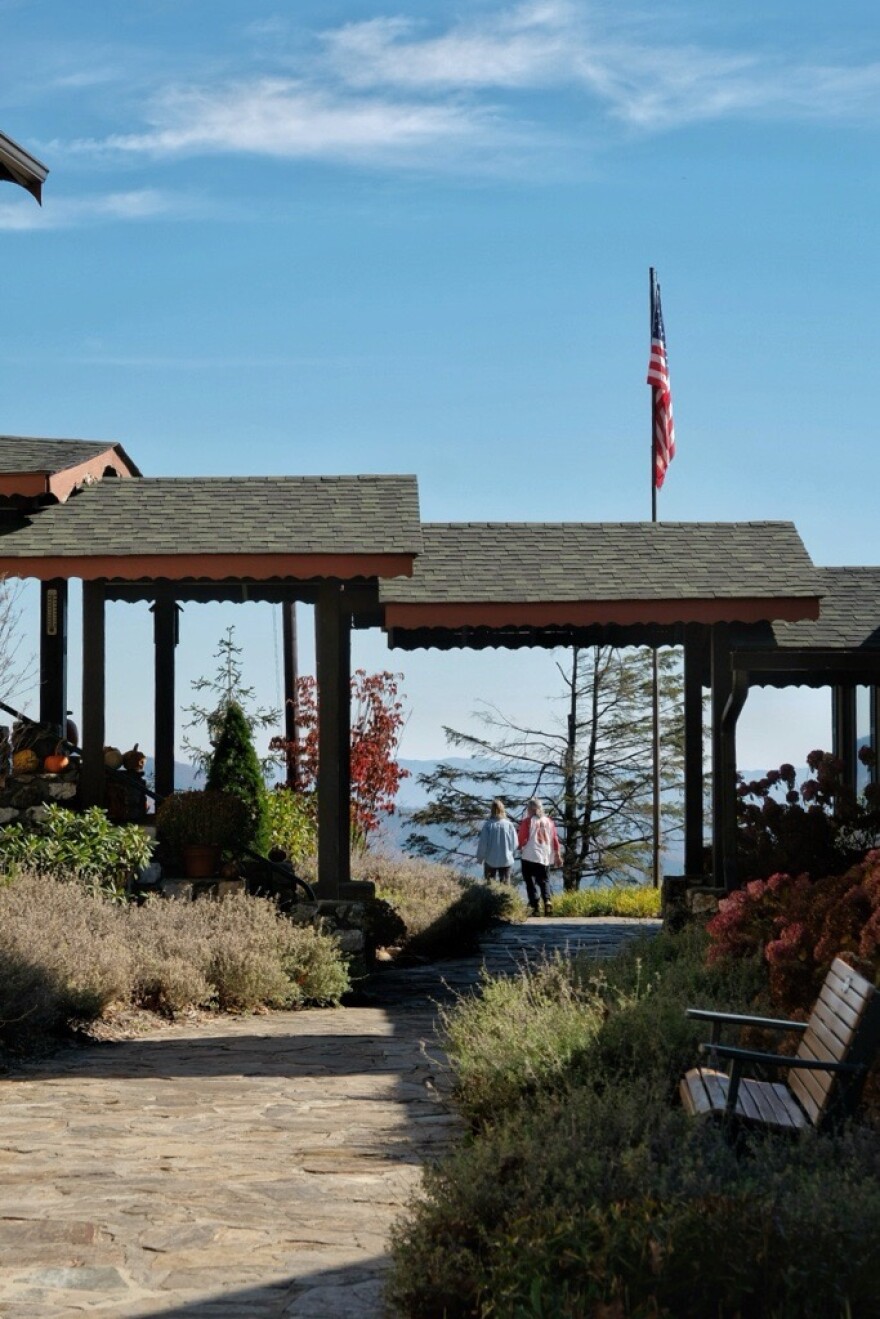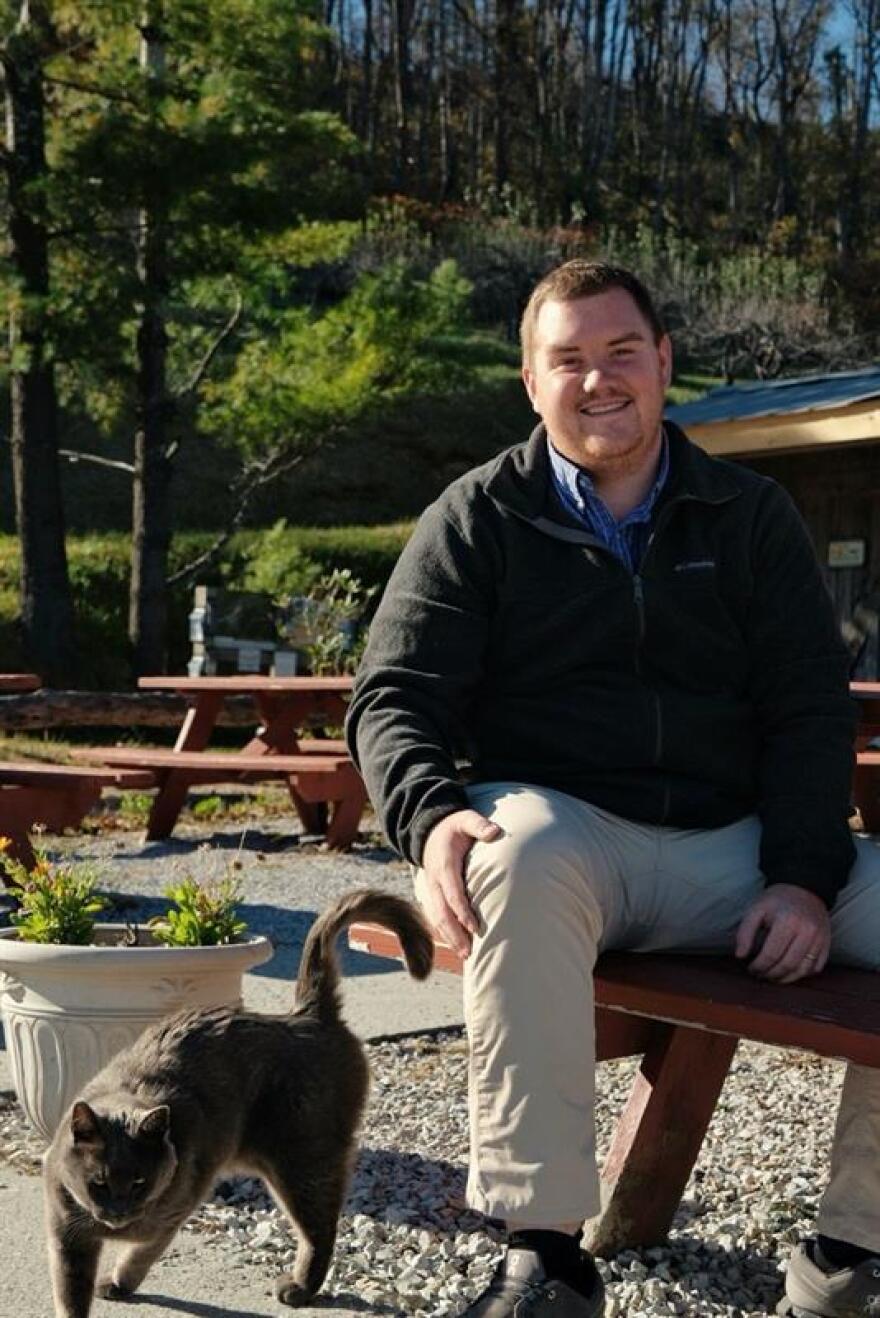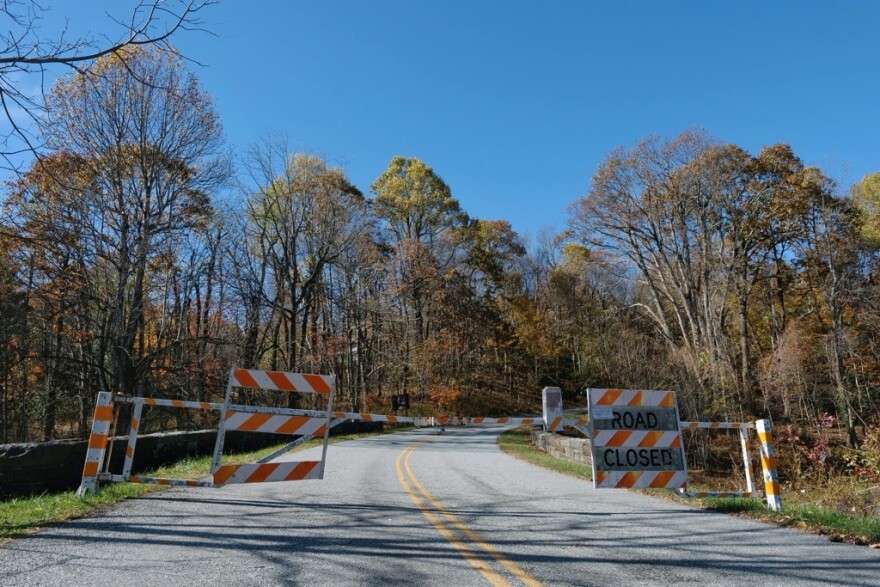David Roe, who helps manage the Switzerland Inn in Mitchell County, has one word to describe the ongoing closure on a nearby section of the Blue Ridge Parkway: devastating.
The usually full hotel has only a trickle of guests. The restaurant, which in past peak seasons has had to turn away visitors because it reaches capacity, now sees a fraction of the guests who once stayed.
The hotel – and its adjoining restaurant, pub and cafe – sit just off a section of the Blue Ridge Parkway that has been described as “ground zero” for damage caused by Hurricane Helene. This section of the parkway – from Mount Mitchell to Little Switzerland – was once a lifeline for tourism-based businesses in the area. But it is not expected to open until late 2026 – meaning local businesses have suffered two lackluster summer and fall tourism seasons.
Businesses along closed sections of the parkway in McDowell, Mitchell and Yancey counties are suffering as they try to come up with new ways to attract visitors – and construction repairs on this section are a long way from being completed.
About 16 million people visit the parkway each year, making it one of the most visited National Park sites, according to data from the National Park Service. And those visitors aren’t just driving through. Data from the agency shows $1.3 billion was spent in communities along the parkway in 2023.

Helene caused almost 60 landslides along the Blue Ridge Parkway and damaged roads, trails and structures. The entire 469-mile parkway was closed after the storm, but sections have gradually reopened.
Meanwhile, at places like the Switzerland Inn – which sits steps away from the parkway – overall business is a fraction of what it normally would be. Roe estimates food services make up about half of the property’s revenue. The other half is made from stays at the hotel.
“ If you come in from the south, from Asheville, there is nothing to stop at. So by the time people get to us, they're very hungry,” he explained.
In normal years, the restaurant is packed and the hotel is booked to capacity for most of the season – roughly May through November – but this year, Roe estimates they were at half of that.
“We could tell this year. Our summers are really busy normally, but this year, it was probably less than half the traffic that we could see,” he said.
The hotel usually employs about 80 people, but as revenues decline, it has been operating with a “skeleton staff” that was cut by more than half, Roe said.
“It disrupts not only us as a business, but the people who we staff,” he said.
To combat the impact of the road closures, the hotel will stay open for the winter season for the first time. Roe hopes that the longer season will attract more visitors to the scenic lodge.
“It's gonna be a really great time to come up here and experience what the mountains have to offer up here during the winter. Not many facilities like ours are open during the winter,” he said.

Van Phillips, a prominent businessman in Mitchell County who sits on the Governor’s Recovery Office for Western North Carolina, said business owners are fighting “a terribly losing battle” with parkway closures.
“ The parkway is a big economic driver for everybody in Western North Carolina. But most of everybody's back up except this stretch right here, and it's been hurting,” he told BPR. “They're being pretty much shut off and have no parkway visits.”
October is usually the busiest month for tourism in the area. And many businesses along the parkway rely on these tourists to stay afloat. If the section of the parkway doesn't reopen in these areas until late next year, businesses would be set to lose three peak tourism seasons.
BPR sent an interview request to a spokesperson for the parkway, but she was not authorized to work during the government shutdown.
Kelly Jones, who leads Mitchell County’s Tourism Development Agency, said the county hasn’t seen a dip in sales or occupancy tax revenue, but that doesn’t tell the entire story.
“ Those numbers are looking really great, but from a tourism aspect, I see, like, our retail and our shops along the pathway that are really struggling. And so, looking at a sales tax perspective, you wouldn't know that,” she said. “ They're not the ones that are being fed into or kind of sought after.”
Jones said volunteer groups who stay at local hotels and locals who shop at furniture and hardware stores are helping to keep county tax numbers up.
The parkway is closed to the south of the Switzerland Inn and then open for a few miles to the north before it closes again north of mile marker 327.
In that short stretch of open road sits Altapass Orchard, a nonprofit apple farm that works to preserve rare varieties of apples. The orchard finances depend entirely on visitors who pay to pick apples and purchase baked goods, as well as donations from visitors.
Sam McKinney, who serves as the sustainability manager, said the storm hit during peak apple-picking season.
Helene knocked down about 15% of their trees, and the loss of visitors resulted in a revenue hit of $300,000 in 2024. That’s about 40% of their total budget.
“We depend on September and October to get us through the whole season. Those are our biggest revenue months. And October brings in more than 70% of our annual budget, just that one month. So it was devastating,” he said.
This year, the season started slowly.
“We were greatly affected by the parkway closures earlier in the season,” he said. “Our first apples come in around the first part of July, and so from July through October we typically have apples, but until, really until Labor Day weekend, we were very, very slow.

Things picked up for the orchard after Labor Day.
“We wouldn't have even known the parkway was closed this fall,” he said, attributing the uptick in visitors to other local businesses recommending customers visit the farm.
McKinney said that despite the somewhat normal fall season, the orchard will still be down in revenue, but not as much as he thought.
“ We were really nervous, especially some weekends into August. I mean, the parking lot was fairly empty and we thought, ‘Are we gonna even be able to sell all the apples that we have?’”
The orchard did sell all its apples for the season, and despite the loss in revenue, McKinney, whose family has tended the land for four generations, has no plans to abandon the work.
And there is a lot of it. The orchard is facing a half-million-dollar repair project after the storm.
“A lot of times when I'm driving into work, it kind of hits me coming down the road, and I look out over it in the mountains, and I just kind of feel like I'm supposed to be here,” he said. “I feel like it's providential that I'm here and still involved with this little piece of land.”



